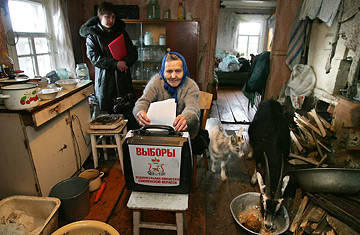
An elderly woman votes inside her house while two goats eat feed at her feet in the village of Shelonets, Russia
On most days, the walled-up, tightly secured area at the outskirts of Khotkovo, a township of some 20,000 people 40 miles northeast of the Russian capital, is Moscow Region's Psychiatric Hospital (MRPH) #5. On Sunday, though, it had a different designation: polling station #2624 in Russia's presidential election.
Elsewhere in Russia, such stations seemed to do a better job of enticing people to vote. In Moscow, polling stations attracted people with pop music, food and markets. In Nizhnevartovsk, Siberia, they offered a lottery with a brand-new apartment as the main prize. All 543 stations in Nizhni Novgorod, Russia's third city, presented voters with lottery tickets that gave them discounts at city shops and the chance to win a Volga car.
But here at Khotkovo, the inducement to vote may have been more stick than carrot. "The higher-ups ordered us to secure a 70 to 80% turnout, or face sacking," a low-level town administration official confided. Elsewhere, too, local officials had to exert themselves to get people to vote. For many in state employ, failure to show up was fraught with risk. High school teachers in some places have bluntly told parents that their kids will have problems if the parents fail to vote. And at army barracks, prisons, or psychiatric institutions, there were little of the raffles, lotteries and other sweeteners offered at some big-city polling stations. The only inducement in evidence at station #2624 was a standard poster, reminding MRPH #5's patients and a few outside voters that "March 2 is the main electoral day of this country!"
Several dozen patients dressed in shapeless gowns sat dejectedly, passports clutched in hand, in the long hallway, facing the door marked "Laboratory." On Sunday, it was not urine or blood samples they were bringing to this door, but their votes, even though most looked like they were barely aware of their surroundings.
There may have been four people on the ballot — the Kremlin's traditional sparring partners, Communist boss Gennadi Zyuganov and Nationalist Vladimir Zhirinovsky, among them — but even the patients of MRPH # 5 were well aware that the purpose of this election was to install Dmitri Medvedev, incumbent deputy prime minister and Gazprom's chairman of the board, as the hand-picked successor of his mentor, President Vladimir Putin. Medvedev vowed to keep Putin as Prime Minister, and Putin has made clear that he envisages his new role as "the highest executive authority in the country".
Neither the stick nor the carrot may actually have been necessary: Having long muzzled the independent media and maintaining tight control over the political process, the Kremlin would face few restraints were it to simply create its own ballot figures. And just in case voters failed to see the point in showing up to vote in an election whose outcome is in such little doubt, the Kremlin also scrapped the 25% turnout threshold previously required to validate an election. Now, all it would take would be for a cop to drag a drunken hobo to a polling station, and their two votes would suffice to elect the President of the Russian Federation. Particularly after the results announced Sunday night showed that the predicted landslide of 73% for Medvedev had been hit precisely, it is obvious that plenty of Russians are enthusiastic about voting "for the right person." Putin may be increasingly authoritarian, but thanks to the massive windfall Russia earned from surging oil prices over his eight years in office, he remains widely popular, and his coattails are long.
Two good-natured women selling meat at the Khotkovo market revealed that they had voted for Medvedev. Things are bad where they come from. "Another two years, there won't be any meat to sell," they say, because agriculture is all but extinct. "Not that voting for Medvedev is going to change much, but there remains a glimpse of hope," they believe. Why? "Because electing Medvedev means that Putin stays in charge," they return. "We're not stupid. We listen to what they have been telling us on TV all along." Thus the power of state-controlled electronic media.
Putin has gone through all this expensive "election" rigmarole because he wants both to retain his grip on power and look presentable to the West. The West pouted — the Organization for Security and Cooperation in Europe (OSCE) refused to send observers, making Putin to do with just 235 foreign observers (some from the European Parliament, most from former Soviet republics) for more than 96,000 polling stations, spread over 11 time zones.
However, observers or not, the West will accept and endorse Putin's electoral farce and post-Soviet Russia's hydrocarbon-fueled nationalism, as long as Russia keeps pumping oil to world markets. If in the process Putin is turning this country into one big Polling Station 2624 — a.k.a. MRPH #5 — it's really up to the Russians.
